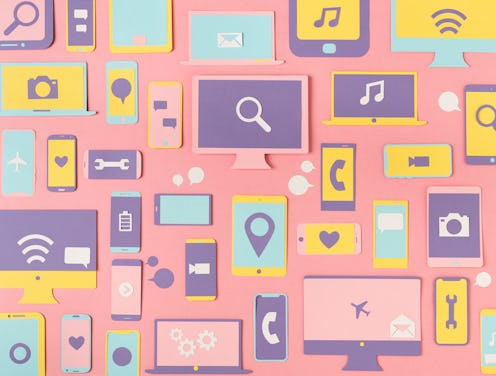Life
Having A Cluttered Computer Desktop Can Be A Sign Of This Little Known Health Issue

I like to collect things. I don't consider myself a hoarder by any means, but I definitely have accumulated more stuff (that I know I don't need) in my room than the average person thanks to my overzealous sentimentality. I think it's the knowing that whatever it is I've kept is somewhere and that it's there for a reason that comforts me. I've recently come to realise that this habit has transferred itself into my digital life, too, and as with everything, there's a name for it. So what exactly is cyber hoarding, and how do you go about decluttering your desktop?
Well believe it or not, cyber hoarding is actually becoming a recognised term for those who have an "unwillingness to delete info gathered online," as Stylist described in a recent article. While it can often arise from jovial situations like a mass of word documents with incoherent file names to folders full of memes you've saved over the year, cyber hoarding can also be detrimental to your mental health. At its worst, it's a digital form of hoarding that can often point towards other mental disorders, and academics are taking note.
The exploration of cyber hoarding will be a major part of research conducted by the European Problematic Use of the Internet Research Network, which will also cover "other internet-related health issues such as gambling, pornography, and gaming," the Guardian reports. Chaired by consultant psychiatrist Prof Naomi Fineberg of the University of Hertfordshire, the network's manifesto notes that "much needs to be done to unpick the issues around problematic internet use, from defining different conditions to understanding whether they are addiction problems or, for example, more akin to obsessive disorders," as detailed in the European Neuropsychopharmacology journal.
As Fineberg pointed out in the article, "nobody knows the extent to which [a condition like cyber hoarding] is developing and causing problems," but it's certainly an issue that needs to be addressed and treated. "What we are interested in is starting to understand and perhaps identify who is vulnerable and perhaps identify treatment options for that group earlier rather than later," Dr Valerie Voon from the University of Cambridge added.
While I'm aware that I have a tendency towards cyber hoarding, I know how to curb it. I make sure that I have monthly "clean-ups" on my desktop, phone, and accounts so my digital life doesn't implode in on itself. But for some this is impossible, as can often become so intrinsically part of your routine that you don't realise it until it starts negatively impacting your life. And this is when you need to do something about it.
"Many of us will save things because we might need them in the future," Head of Information at Mind, Stephen Buckley explained to Stylist. "Hoarding is when your need to keep things causes you distress or interferes with your day to day life.
"If hoarding is having a negative impact on your life, there are small steps that can make a difference," he said. "For example, keeping a diary can help you discover patterns in what triggers your hoarding behaviours so you can spot early warning signs."
That may sound simple, but it's a total step stone in the right direction.